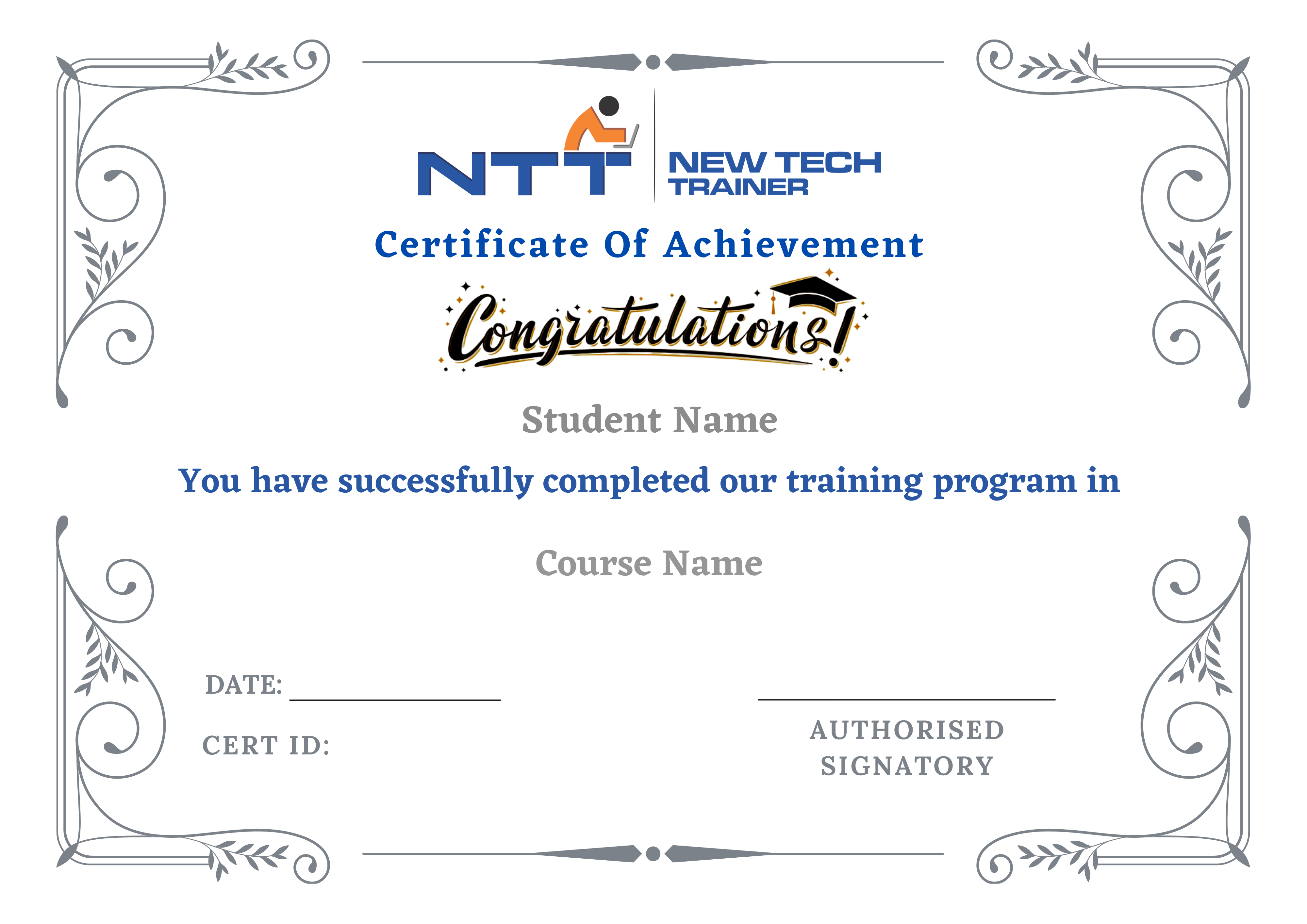Upcoming Batch Schedule for Ansible Training in Bangalore
New Tech Trainer provides flexible batch timings to all our students.If this schedule doesn’t match please let us know.
| 10-06-2021 | Thu (Mon – Fri)WEEKDAYS BATCH | @08:00 AM (IST)(Class 1Hr – 1:30Hrs) / Per Session | Get Quotes |
| 10-06-2021 | Thu (Mon – Fri)WEEKDAYS BATCH | @08:00 AM (IST)(Class 1Hr – 1:30Hrs) / Per Session | Get Quotes |
| 10-06-2021 | Thu (Mon – Fri)WEEKDAYS BATCH | @08:00 AM (IST)(Class 1Hr – 1:30Hrs) / Per Session | Get Quotes |
|
Can’t find a batch you were looking for? |
|||
Best Ansible automation training in Bangalore course overview
With an Ansible automation training in Bangalore at new tech trainer, you will be able to simplifies IT tasks, including application deployment, configuration management, and orchestration. By choosing the best ansible training institute, you can able to manage a declarative language and agentless architecture, enabling seamless automation across diverse environments. With Ansible, you can efficiently manage both on-premises and cloud infrastructures, eliminating manual intervention and reducing the risk of errors. NTT is the best ansible training institute in Bangalore
Key Features and Benefits Ansible Training Course in Bangalore
Agentless Architecture
Ansible's agentless nature eliminates the need to install software on managed hosts, reducing complexity and improving scalability.
Declarative Language
Ansible uses YAML, a human-readable language, to define automation tasks, making it easy to understand, maintain, and share playbooks.
Infrastructure as Code (IaC)
Ansible allows you to treat your infrastructure as code, enabling version control, code reviews, and collaboration.
Idempotency
Ansible ensures that running a playbook multiple times has the same effect as running it once, promoting stability and predictability.
Extensibility:
Ansible's vast collection of modules and plugins facilitates integration with various tools, platforms, and technologies, enhancing its versatility.
Skills Covered
- Introduction to ansible configuration management
- Overview on how to plan infra code using ansible
- Writing playbooks
- Ansible variables/prompt/debug
- Conditions in ansible
- Loops in ansible
- Roles in ansible
- Include and import in Ansible
- Using ansible galaxy
Ansible FAQ’s
Is prior programming experience necessary to learn Ansible?
Ansible doesn't require extensive programming knowledge. However, familiarity with basic scripting concepts and YAML syntax can be beneficial.
Can Ansible automate cloud infrastructure management?
Yes, Ansible can automate the management of both on-premises and cloud infrastructures, including popular cloud platforms like AWS, Azure, and Google Cloud.
Is Ansible only suitable for Linux environments?
No, Ansible supports a wide range of platforms, including Windows, macOS, and various Linux distributions.
Are there any prerequisites for Ansible training?
While prior knowledge of Linux and command-line basics can be helpful, many Ansible training programs cater to beginners.
Can Ansible be integrated with other automation tools?
Yes, Ansible can integrate with various tools and platforms, allowing you to create powerful automation workflows.
Is Ansible suitable for large-scale environments?
Ansible's scalability and agentless architecture make it suitable for managing large-scale environments effortlessly.
How can I get hands-on experience with Ansible?
You can practice Ansible by setting up a lab environment, exploring official Ansible documentation, and participating in hands-on exercises or workshops.
Ansible Training Key Features
10+
Hours of theory classes
20+
Hours of live demo
2+
Real-time industry projects
4+
Hours of Q&A Session
2+
MOC exams test which help to pass exam
40+
Hours of training
Flexible timing
Introducing Ansible – A configuration management tool
- Installing ansible
- Understanding Ansible architecture
- Control Machine Requirements
- Managed Node Requirements
Customizing ansible config file
Inventory in ansible
- Declaring Hosts and host Groups
- Host alias
- Using dynamic inventory
Learn various ansible Modules
How to use AD-hoc commands
- Parallelism and Shell Commands
- File Transfer
- Managing Packages
- Users and Groups
- Deploying from Source Control
- Managing Services
Introduction to YAML script
Playbook
- About Playbooks
- Playbook Language Example – YAML
- How to Write Playbooks
- Declaring variables and calling variables
- Using ansible prompts and debug module
- Tasks in Playbooks
- Understanding about various tasks in playbook
- Using modules in playbook
- Introduction to Handlers and notify
- Learn about using handlers and calling notify
- Using conditions in playbook
- Using ansible setup to analyse and plan playbook
- Using ansible loops for multiple task
Roles
- Role Directory Structure
- How to create Ansible Role and use it
- Using an ansible role in playbook
- How to use Ansible Galaxy to download roles.
- Writing task in roles
- Role Default Variables
- Role files
- Using handlers in roles
- Ansible Galaxy
Including and Importing
- Includes vs. Imports
- Importing Playbooks
- Including and Importing Task Files
- Using import in roles
Project
- Writing a playbook to install and configure webservers and deploy an application
What we learn in this Ansible Training Content
New Tech Trainer is the best institute to learn ansible Online Training
Our unique Ansible training content covers a wide range of topics to equip you with the knowledge and skills required for successful automation implementation. Here’s an overview of the key modules covered in our comprehensive training:
Ansible Basics
Get started with Ansible by understanding its architecture, components, and core concepts.
Playbooks and Roles
Learn how to write efficient playbooks and organize tasks using roles to achieve desired automation outcomes.
Inventory and Variables
Explore the concepts of inventory management and variables to handle dynamic environments effectively.
Module Deep Dive
Dive deep into Ansible's extensive module library, which provides pre-built functionality for diverse tasks.
Best Practices
Discover industry best practices for playbook structure, error handling, security, and performance optimization.
Ansible Variables: Enhancing Flexibility
Variables in Ansible play a crucial role in making your automation tasks flexible and dynamic. With variables, you can customize playbooks and make them adaptable to different environments and scenarios. Here's what you'll learn about Ansible variables:
Variable Declaration: You will discover how to define and use variables in Ansible, both at the playbook level and within roles. You can leverage variables to store values such as IP addresses, file paths, or user-defined data.
Variable Scope: Understanding variable scope is vital to ensure the correct usage of variables within playbooks and tasks. Ansible provides various scopes, including global, play, host, and task, each with its specific purpose and visibility.
Variable Precedence: Ansible follows a specific order of precedence when resolving variables, allowing you to override default values or inherit variables from different sources. You'll learn how to manage variable precedence to achieve the desired behaviour in your automation tasks.
Conditions: Controlling the Flow of Execution
In Ansible, conditions allow you to control the flow of playbook execution based on specific criteria. Conditions enable you to implement logic, perform checks, and execute tasks conditionally. Here's what you'll learn about conditions in Ansible:
Conditional Statements: Ansible provides various conditional statements, including when and failed_when, which allow you to define conditions for task execution. You'll explore different operators, such as equality, comparison, and membership operators, to create precise conditions.
Combining Conditions: You can combine multiple conditions using logical operators (and, or, not) to create complex conditional expressions. This enables you to implement sophisticated logic and fine-tune the behavior of your playbooks.
Using Ansible Facts in Conditions: Ansible gathers system information as facts during playbook execution. You'll learn how to utilize these facts in conditions, making decisions based on factors such as operating system, network configuration, or hardware specifications.
Loops: Iterating and Repetition
Loops in Ansible allow you to repeat tasks and perform iterations, enhancing the automation process. Whether it's applying configurations to multiple hosts or installing packages on a list of servers, loops simplify repetitive operations. Here's what you'll learn about loops in Ansible:
Looping Constructs: Ansible supports various looping constructs, such as with_items (deprecated in Ansible 2.5+), loop, and with_* loops. You'll learn how to use these constructs to iterate over lists, dictionaries, and other data structures.
Loop Control Statements: Ansible provides loop control statements, such as loop_control, that allow you to modify the behavior of loops. You can skip iterations, break out of loops prematurely, or control loop indexing.
Combining Loops with Conditions: You can combine loops with conditions to create powerful automation logic. This enables you to iterate over a list of items while applying specific conditions or filtering out undesired elements.
Ansible Vault: Securing Sensitive Data
Securing sensitive data, such as passwords, API keys, or encryption keys, is a critical aspect of automation. Ansible Vault provides a solution for encrypting and protecting sensitive information within playbooks and variables. Here's what you'll learn about Ansible Vault:
Encrypting Secrets: Ansible Vault allows you to encrypt sensitive data using a password or encryption key. You'll learn how to create encrypted files or encrypt specific variables within playbooks.
Decrypting Secrets: Ansible provides commands and options to decrypt encrypted files or specific variables, enabling you to retrieve the decrypted values during playbook execution.
Integrating Vault with Playbooks: You'll learn how to seamlessly integrate Ansible Vault with your playbooks, ensuring secure handling of sensitive data. This includes using encrypted files as variables, passing encrypted values as command-line arguments, or using vaulted variables within tasks.
Real-World Use Cases
Gain insights into real-world use cases where Ansible has been successfully employed to automate complex IT workflows.
Hiring Companies














How do I get certificate from Thick Brain Technologies?
Here we will provide certification from our organization which is valid for 2 year where you can show with any IT organizations.
To enable your certification
- Attend and complete Ansible Training
- Complete a hands-on project with mock test where pass mark is 70%.
What are the prerequisites to go with Ansible Global certification?
Experience in working with python programming or training completion is recommended.
How do I become an Ansible certified with global certification?
You can register for python global certification from authorised centres like Python Institute (PCEP) , we will guide students about registration and exam process.
Trainer Profile
- More than 8+ Years of Experience.
- Trained more than 3000+ students in past years.
- Strong Theoretical & Practical Knowledge in the subject.
- Always we hire Certified Professionals trainers.
- Trainers are well connected with Hiring HRs in multinational companies.
- Expert level Subject Knowledge and fully up-to-date on real-world industry applications.
- Trainers have worked with multiple real-time projects in corporate Industries.
- All Our Trainers are working with multinational companies such as CTS, TCS, HCL Technologies, ZOHO, IBM, HP, Microland, Infosys Technologies etc…
- Our trainers help the candidates in completing their projects and even prepare them for interview questions and answers.

Why to choose Thick Brain Technologies?
New Tech Trainer is the best online training course provider India with 10+ years of Experienced professionals as Trainers. We will provide
- Fully hands-on training with live projects
- Professionals as trainers and helping on Interview preparation
- Completed 500+ batches in short period
- job-oriented training & Certification guidance
- we provide best offers on all the courses.
How about trainers and how they train us?
- Our trainers are more than 10+ years of experience in relevant technologies.
- We choose our trainers who working on real-world industry project and who working in multinational companies. Our trainers are certified professionals in subject.
- Trainer Trained more than 2000+ students and having Strong theoretical & practical knowledge.
Course duration and timing?
- 40+ hours course training duration
- We are very flexible and we will arrange training's based on your timing and trainer availability
Support on resume and interview?
We will support on high quality resume preparation which helps you to showcase in your interview.
Our trainers will take each topic with interview scenario question which help to understand the subject and prepare you for interview process.
How online section will be conducted?
We will share the zoom sections where you can connect to attend the training.
What we will gain post completing the course?
Post completing the training with us, you will be having batter understanding about infra services and how to deploy/manage the infra services. By this knowledge you can clear your interview easily.





